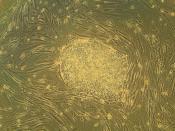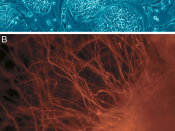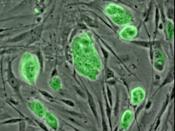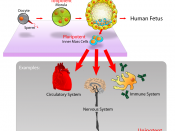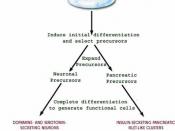Can stem cells cure Alzheimer's, Blindness, Parkinson's disease, maybe even cancer? Could stem cells cure spinal paralysis or stroke? Can stem cells aide all those waiting for bone marrow transplants? The fact that stem cell researchers can be asked these questions is reason enough to pursue this area of science. Do the positives of stem cell research outweigh the negatives? Yes.
Stem cells: The immature cells from which all blood cells develop. These cells may divide to form more stem cells or mature into a variety of blood cell types. They are also called "Master Cells" because they generate into other differentiated cell types. Each tissue within the body contains a unique type of stem cells that renew and replace that tissue like nerve, brain, cartilage, blood and when needed due to damage or wear and tear. Stem cells of the blood, hematopoietic stem cells, generate all other blood cells in the human body, including red blood cells, platelets, and white blood cells.
Sources of hematopoietic stem cells include umbilical cord blood, bone marrow, peripheral blood and embryos. Stem cells divide and when a stem cell divides, each new cell has the potential to either remain a stem cell or become another type of cell with a more specialized function, such as a muscle cell, a red blood cell, or a brain cell. If stem cells could be isolated many diseases could be fought with greater success and it could potentially change the entire spectrum of life and health as we know it today.
November 1998, James Thomson successfully isolated stem cells from human embryos and aborted fetuses. A new world in scientific research has been opened. A fierce debate of ethics also begins.
The medical value of stem cells is their potential to give rise to any of the tissues contained in the human body. There are currently two sources of stem cells used for research, adult or mature stem cells, and embryonic stem cells. Unfortunately, the best source for stem cells is human fetal tissues. To extract the stem cells, you will in turn, kill the embryo. Those against stem cell research believe that using embryonic stem cells is equivalent to the killing of one person to benefit another. The reason that people look down upon stem cell research is because to obtain the stem cells, the embryo must be destroyed. While it is true that most embryonic stem cells are obtained from aborted fetuses, there still is resistance to this. The reason for this is that those opposing to make abortions illegal do not want these stem cells used. Why? Because it is "a consolation to abortions, making something good come out of evil." The argument to keep abortions legal now includes the fact that an abortion potentially could save lives. This fact hinders the debate that abortions should be illegal. But lest we forget as of March 24, 2005 abortions in the united stated were still legal. And since they are legal and since they are being committed daily, why not attempt to save lives if the opportunity is there. I am not attempting to debate whether or not abortion is morally or ethically correct, I am simply stating the facts that we are all aware of. Abortions are taking place and scientists have a use for embryonic stem cells, why not aide them in their search to save live instead of hindering them.
Bibliography"Women's Responses to an Activity-Based Introductory Physics Program," The Journal of Education and Physics Research, Am. J. Phys Supplement. 65, July 1999
